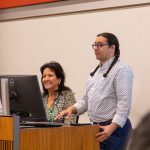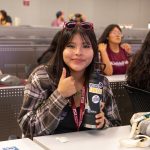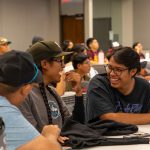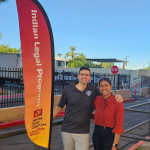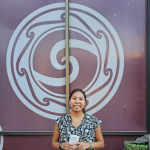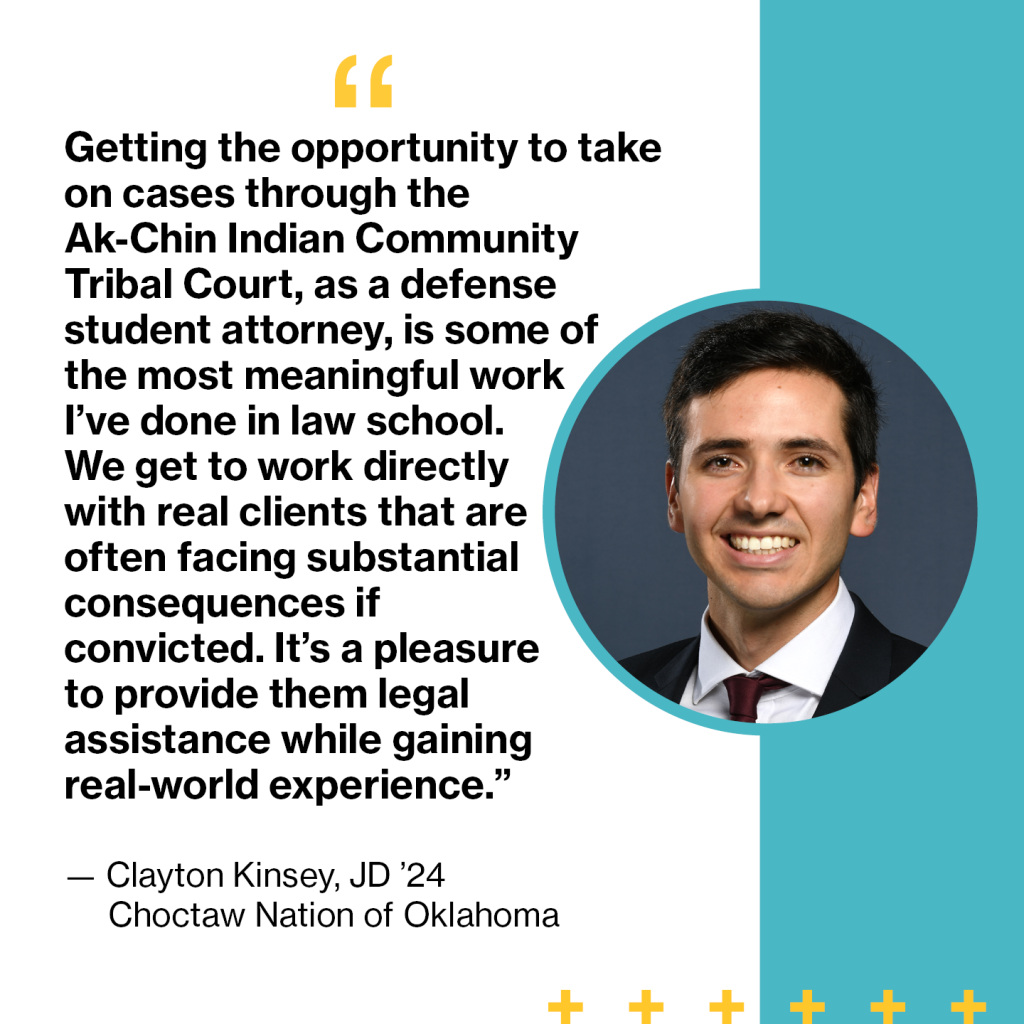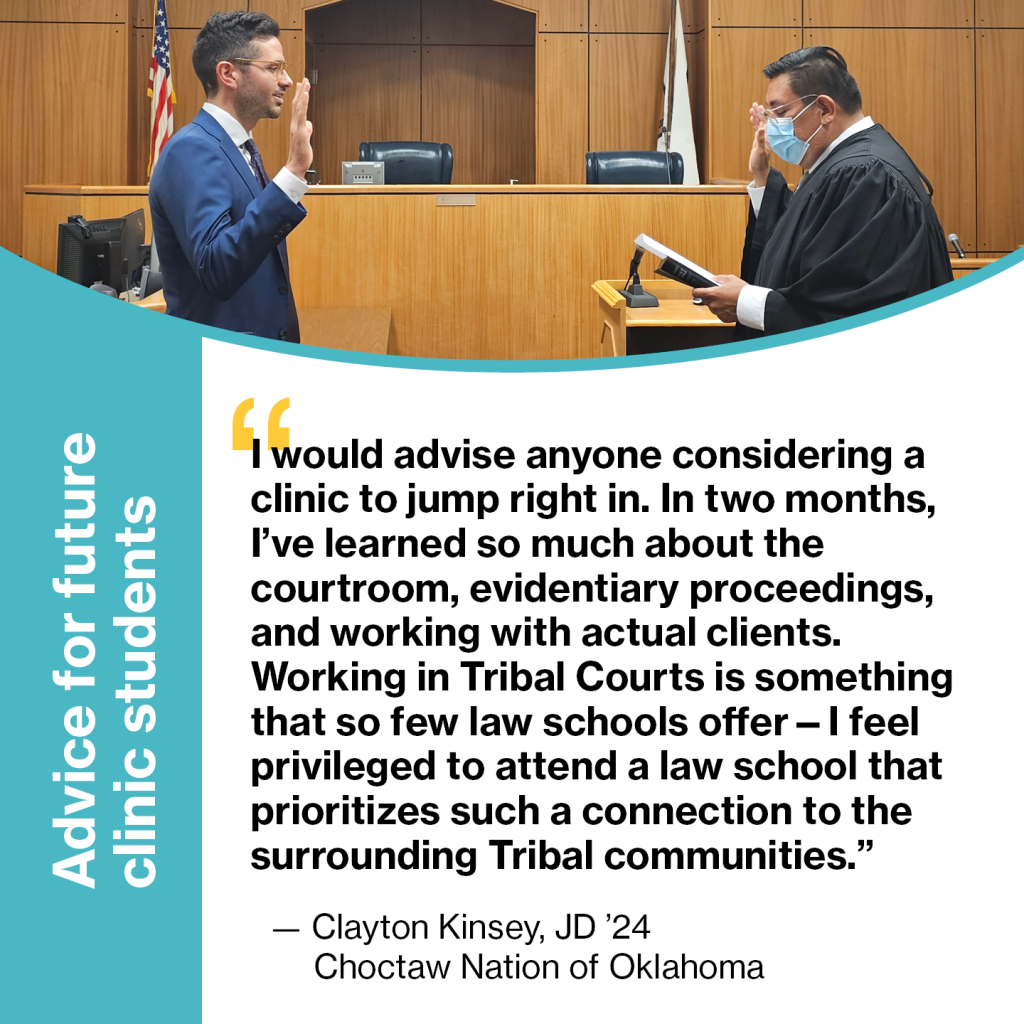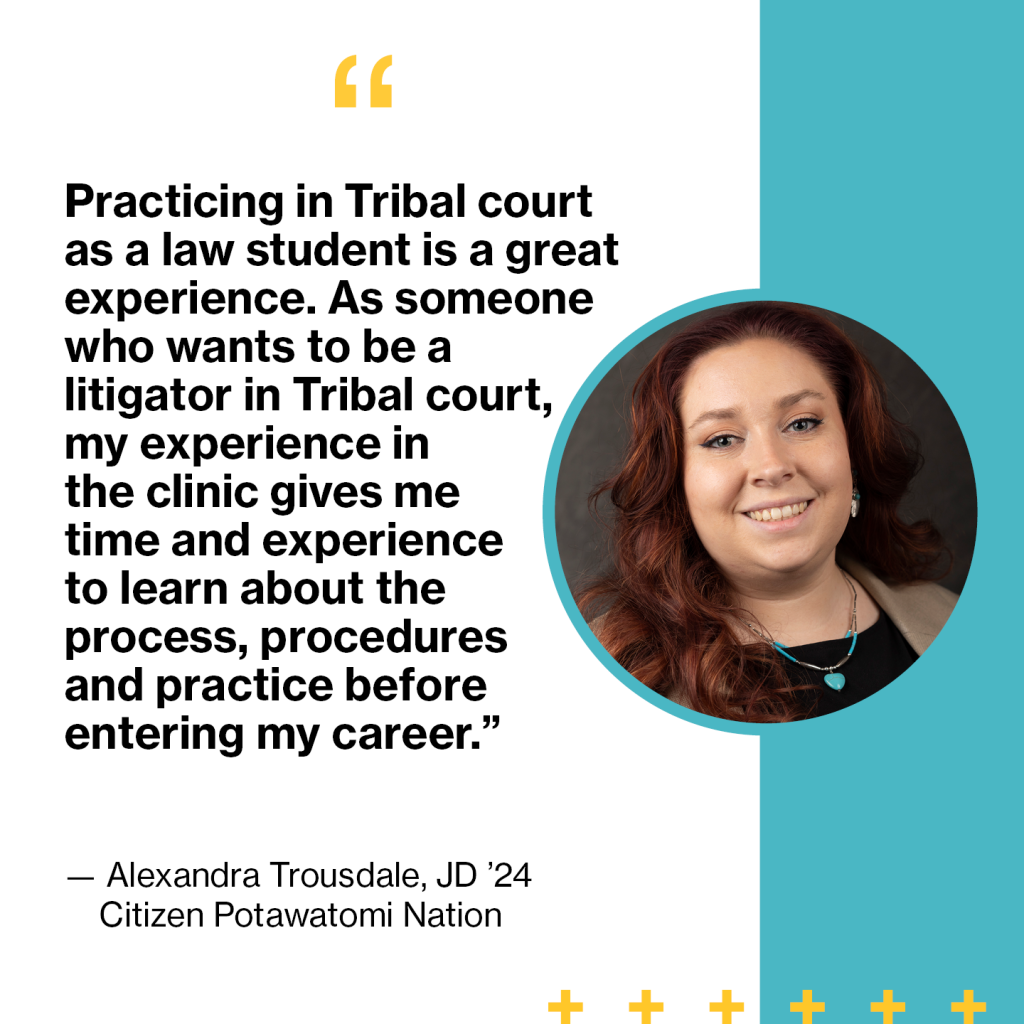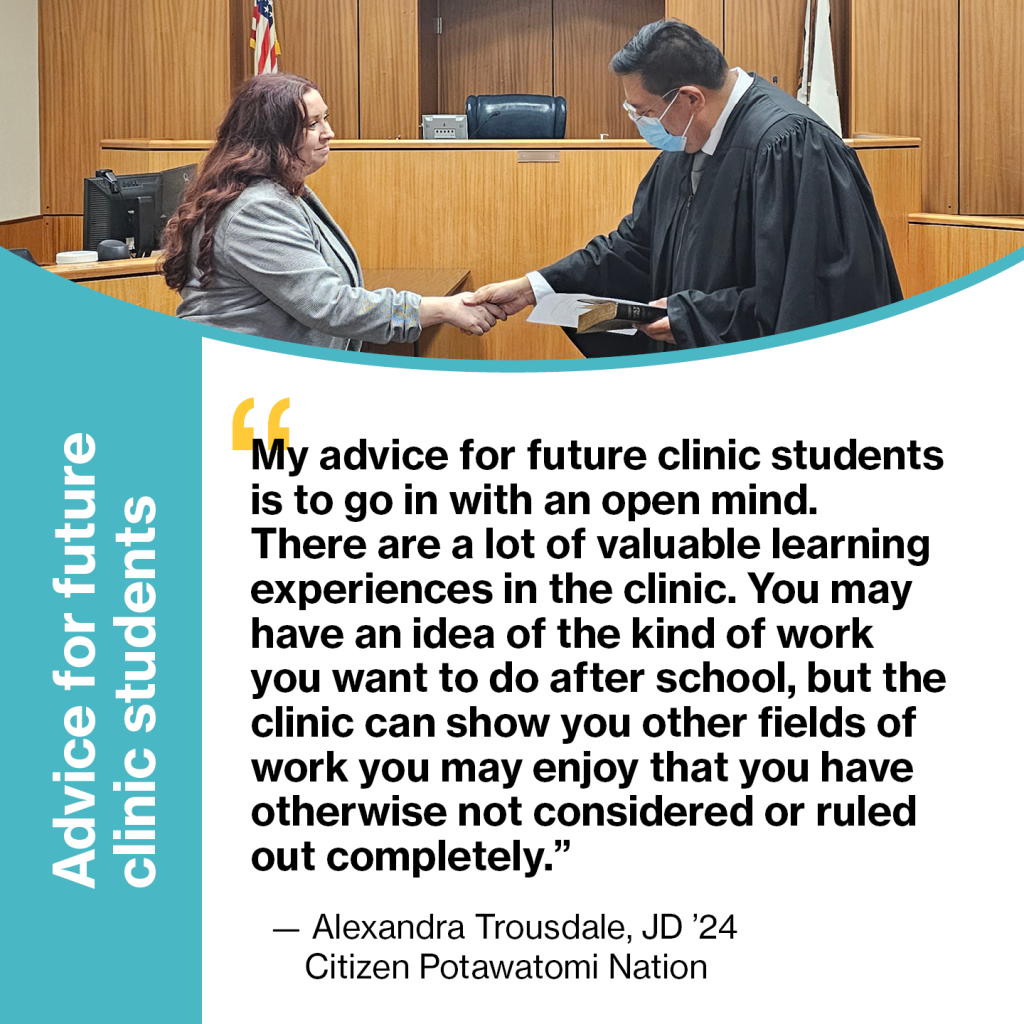Category Archives: Students
INSPIRE at ASU Law
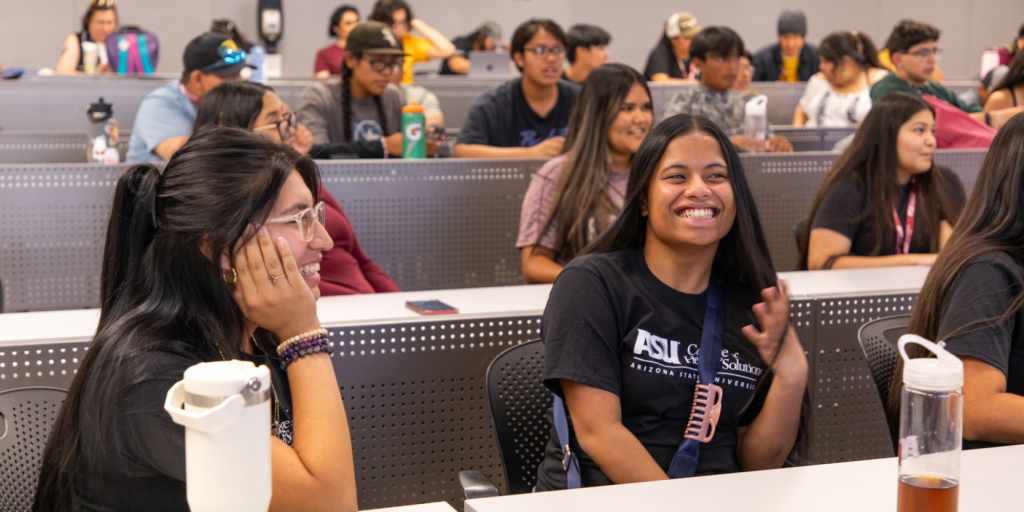
On June 19, 73 Native American high school students representing 22 Tribal Nations participated in the INSPIRE program and visited the law school to learn about the Native American Pathway to Law Initiative. ASU’s Office of American Indian Initiatives hosts the INSPIRE program annually, a week-long college readiness initiative for Native American high school students from various Arizona Tribes. Kate Rosier, ILP executive director, and Crispin South, second-year law student and president of ASU’s Native American Law Students Association, delivered presentations and facilitated mock trials where students argued their positions in the cases. Patty Ferguson-Bohnee, director of the Indian Legal Clinic, and Danielle Williams, communications specialist, distributed promotional items to the students.
We express out gratitude to the Office of American Indian Initiatives for continuing to provide this enriching experience.
2023-2024 Indian Gaming and Tribal-Self Governance programs Year in Review
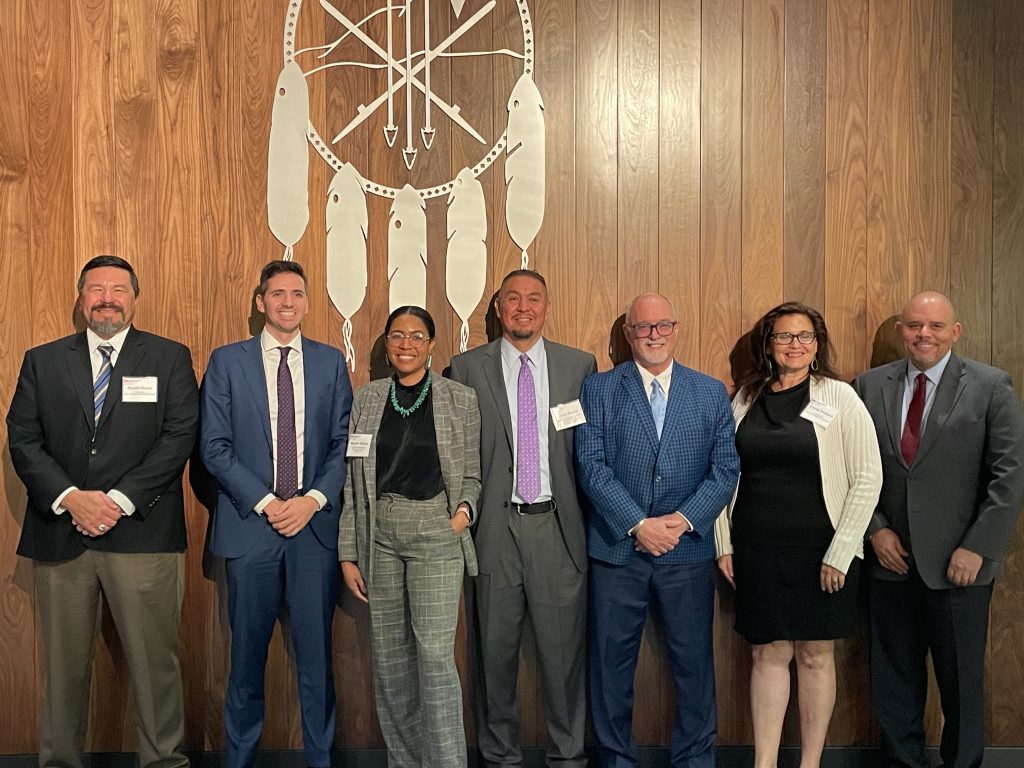
Derrick Beetso (’10), Director Indian Gaming and Tribal Self-Governance Programs at ASU Law, and Theresa Beaulieu, assistant director, collaborated with ASU Law faculty and staff for a “Take your kid to work day.” Children of all ages toured the law school, participated in a mock trial and received a behind-the-scenes look at the studios of the ICT Newscast, located at the ASU Walter Cronkite School of Journalism and Mass Communication.
In October, the Programs hosted a conference at the Yuhaaviatam of San Manuel Event Center at ASU California Center.
Along with Rodina Cave Parnall (‘01), director of the American Indian Law Center, Inc., Beaulieu presented a workshop, “Law School and Careers in a Nutshell” at the National Indian Education Association’s annual convention in Albuquerque, New Mexico. This interactive workshop helped students understand pre-law preparation, types of legal degrees and career opportunities.
The Programs also represented at the Arizona Indian Gaming Association’s annual Expo at Harrah’s Ak-Chin Casino. Beaulieu met with those interested in the Master of Legal Studies programs.
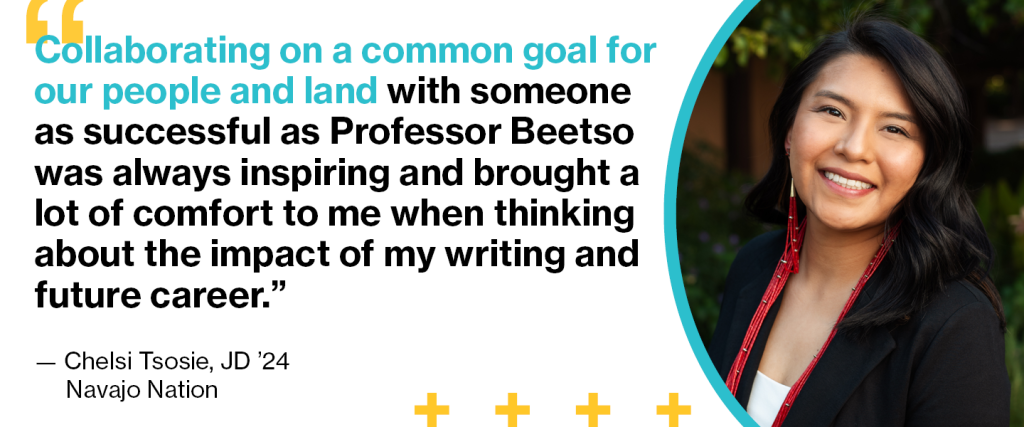
“Professor Beetso enjoys getting students involved in Federal Indian Law projects outside of law school that have been very valuable to me,” said Chelsi Tsosie, JD ’24. “Together, we worked on an amicus brief for Arizona v. Navajo Nation and I would not have had an opportunity like that if he hadn’t reached out to students like me. While working with Professor Beetso on the amicus brief, my Graduations Writing Requirement paper and my paper for his DC Traveling Class, I found it much easier to understand his teachings and feedback about Federal Indian Law topics because of the connection we have to the same Nation. Collaborating on a common goal for our people and land with someone as successful as Professor Beetso was always inspiring and brought a lot of comfort to me when thinking about the impact of my writing and future career.”
Beetso facilitated the opening tribal leaders’ discussion at the inaugural Arizona Indian Gaming Conference hosted by the Arizona Department of Gaming, and Beetso also presented on the Department of the Interior’s recently finalized Tribal-State Gaming Compact regulations at the Western Indian Gaming Conference hosted by the Pechanga Band of Indians.
The Programs were also well represented at the 2024 Tribal Self-Governance Conference at the Wild Horse Pass Resorts & Casino. Jay Spaan, executive director of the Self-Governance Communication and Education Tribal Consortium and ASU Law faculty associate, hosted tribes from across Indian Country at this event.
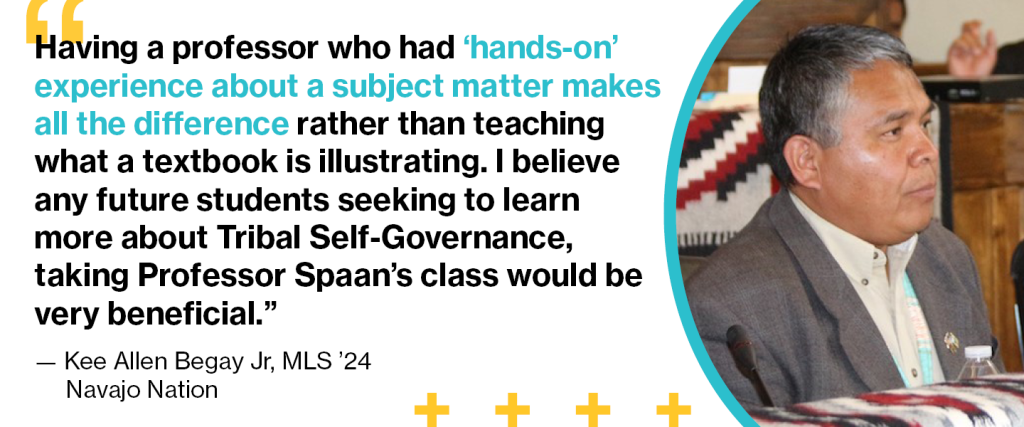
“Professor Spaan went deeper into the content of the policy and had us review and research the policy, and how tribes are benefiting by providing services to their community,” said Kee Allen Begay Jr. (MLS ’24). “Having a professor who had ‘hands-on’ experience about a subject matter makes all the difference rather than teaching what a textbook is illustrating. I believe any future students seeking to learn more about Tribal Self-Governance, taking Professor Spaan class would be very beneficial.”
Beetso was joined by Francisco Olea (’22) and Jeannie Hovland, Vice-Chair, National Indian Gaming Commission to present on the topic, “What’s New with Gaming? Self-Regulation and Other Hot Topics.”
Beetso also presented with Beaulieu and Joey Dormady, assistant dean, Graduate Programs and New Education Initiatives about the Master of Legal Studies options available at ASU Law, including: Federal Indian Law, Tribal Self-Governance, Indian Gaming and Master of Human Resources and Employment Law. Participants explored multiple work scenarios related to Tribal Self-Governance where it would be helpful to have a greater understanding of the law.
Jennifer Boehm, a Master of Legal Studies student with a focus in Tribal Self-Governance, moderated the panel, “Self-Governance Basics at the Department of Transportation,” which featured Arlando Teller, Assistant Secretary for Tribal Affairs, Department of Transportation; Milo Booth, Tribal Affairs Director, Department of Transportation; and Eldridge Onco, Senior Tribal Affairs Advisor, Department of Transportation
We are proud of the 14 MLS students who graduated during the 2023-2024 academic year, specializing in Indian Gaming, Federal Indian Law, and Tribal Self-Governance. Congratulations to this year’s MLS graduates!
Kee Allen Begay, Jr, Navajo
Randy Bouchard, Cowlitz
Tracy Edwards
Elise-Alexandria Green
Ana Hernandez
Charles LaRoche, Lower Brule Sioux
Delban Leslie
Keely Marquez, Serrano
Rileyann Nallin
Jaylyn Parrent, Salish and Kootenai
Faron Scissons, Rosebud Sioux
Ashlee Swain Rios, Pomo
Maotheeker (Wealthy) Vue
Elizabeth Zingg, Ho-Chunk Nation
Twenty-six students are currently enrolled in these MLS programs. With the support of the San Manuel Band of Mission Indians, the ASU Law’s Indian Gaming and Tribal Self Governance programs were able to support externship experiences for six ILP students. Kaleb Lester (3L) and Maryam Gary Nez (3L) worked at Salt River’s Prosecutor’s Office, Sophie Staires (3L) worked in the Department of Justice’s Environment and Natural Resources Division, and Elizabeth Zingg (MLS ’24) externed at for the Self-Governance Communication and Education Tribal Consortium. Sam Phillips (2L) and Colten Fredericks (2L) are working this summer at the Office of Indian Gaming in Washington, D.C.
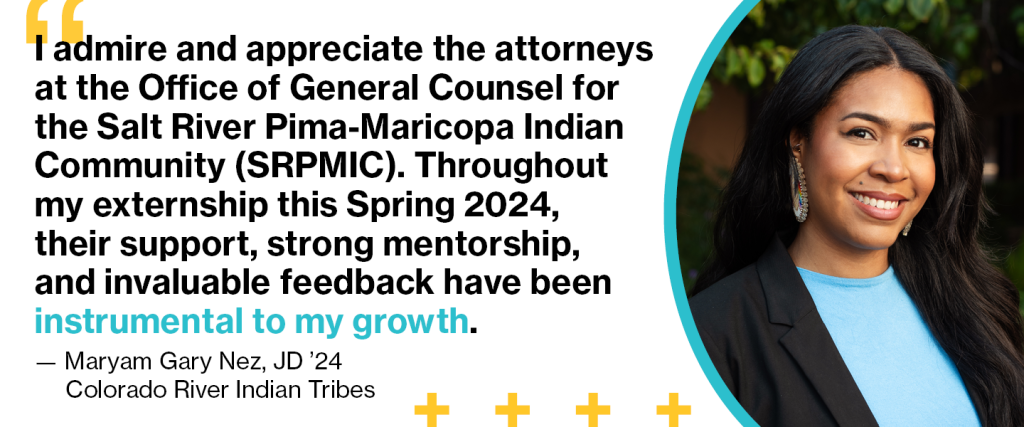
“I admire and appreciate the attorneys at the Office of General Counsel for the Salt River Pima-Maricopa Indian Community (SRPMIC),” said Gary Nez. “Throughout my externship this Spring 2024, their support, strong mentorship, and invaluable feedback have been instrumental to my growth. I appreciate the inclusive environment, and how the attorneys have allowed me to work on projects aligned with my interests. I’ve gained valuable insights into Indian Child Welfare (ICWA) work, which will undoubtedly shape my future career in this field post-graduation. I’m so thankful for their guidance and encouragement.”
ILC 2023-2024 Year in Review
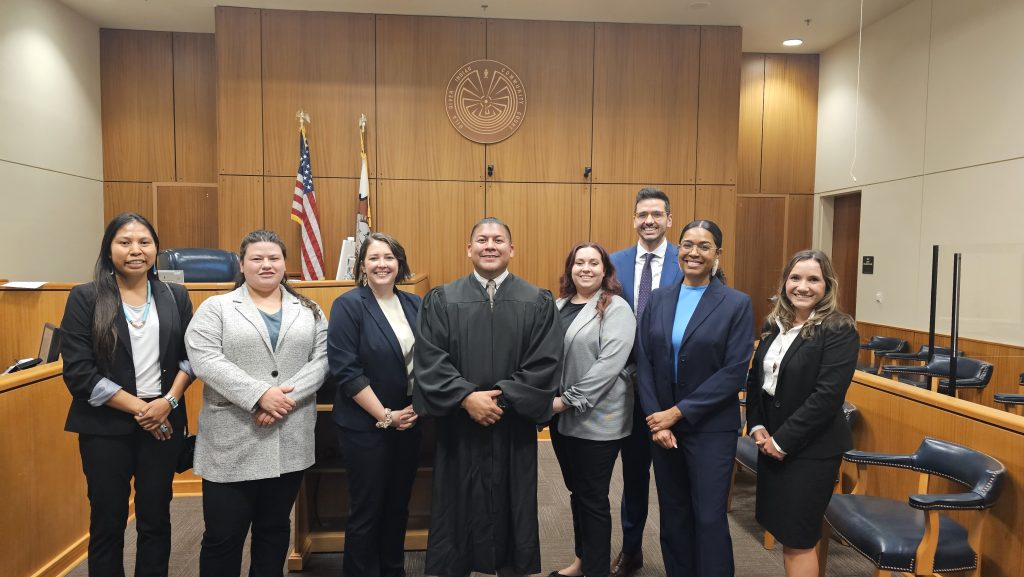
During the 2023-2024 academic year, 10 student attorneys worked nearly 3,300 hours for the Indian Legal Clinic led by Patty Ferguson-Bohnee, ILC Director and the Charles M. Brewer Professor of Trial Advocacy at ASU Law. Student attorneys collectively handled 39 cases covering a variety of areas of tribal, state and federal law. The ILC worked with clients to support voting rights, advocate for guardianships, defend against criminal charges, restore civil rights, assist with federal recognition, among other issues.
In addition to casework, ILC students develop practical analytical and trial advocacy skills through numerous class simulations. The simulations culminate in a full Tribal court civil mock trial to prepare students to become effective advocates for justice in their future careers.
Notably, the ILC welcomed Joel Edman as Democracy Director for the ILC’s Native Vote Election Protection Project. Also, the ILC welcomed Jordan Garcia (‘23) as the new ILC Fellow.
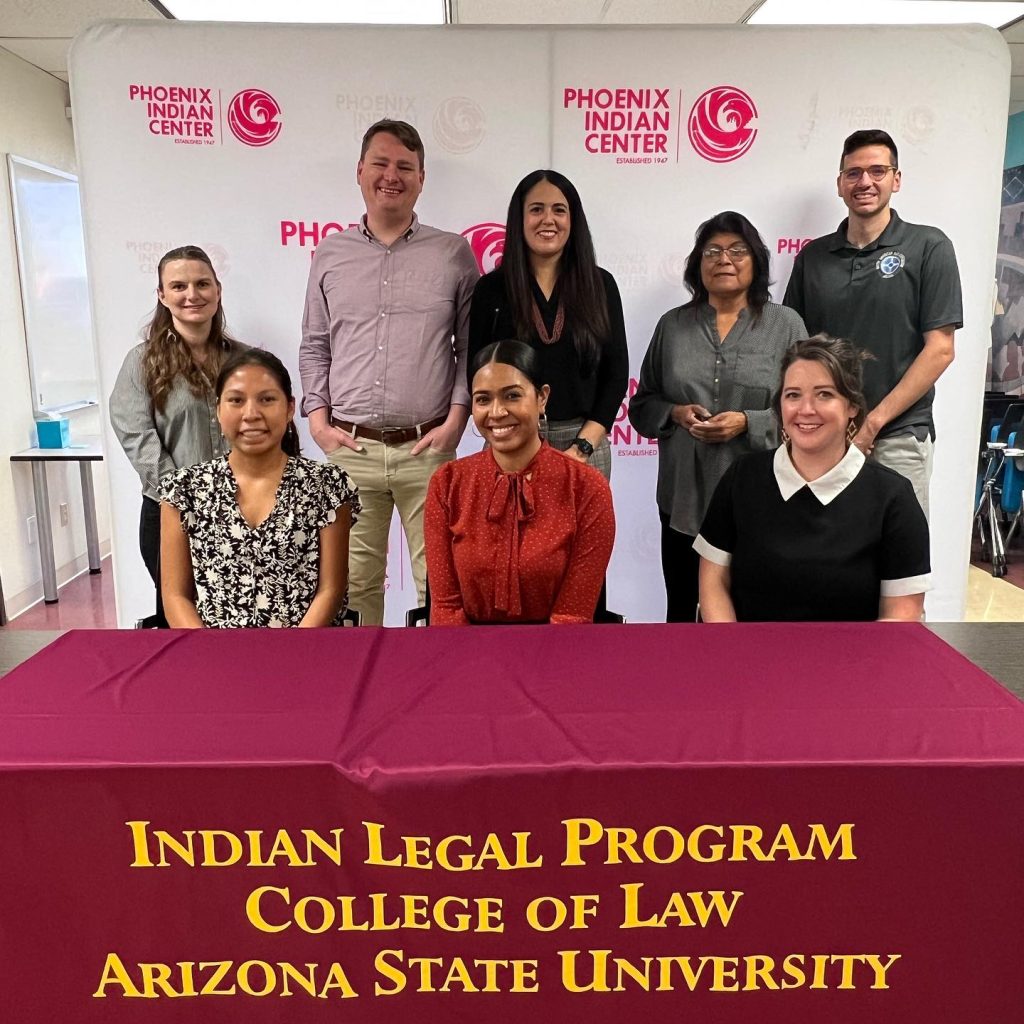
This year, the Indian Legal Clinic began an initiative led by Democracy Director Joel Edman to restore disenfranchised individuals’ civil rights, including the right to vote. In Fall 2023, ILC partnered with the Phoenix Indian Center and the Hopi Tribe to host Rights Restoration Workshops to offer free legal assistance with restoring civil rights after a felony conviction. In November, Student attorneys Maryam Gary Nez (’24), Clayton Kinsey (’24) and Natalia Sells (’24) traveled with Director Patty Ferguson-Bohnee and Democracy Director Joel Edman to Kykotsmovi Village, Arizona on the Hopi Reservation to meet with the Hopi Chairman, Timothy Nuvangyaoma, and other tribal members to present information on rights restoration. During the workshops, student attorneys – notably Sophie Staires (’24) – presented information on the rights restoration process for single and multiple felonies, marijuana expungement and the set aside process.
ILC students frequently made appearances in tribal and state courts in fall and spring semesters. Alexandra Trousdale (’24), Maryam Salazar (’24), Clayton Kinsey (‘24), Natalia Sells (’24), Keely Driscoll (3L), Chelsi Tsosie (’24), Samir Grover (’24) all defended clients in Ak-Chin Indian Community Tribal Court. Staires nearly appeared in Traffic Court on behalf of the Gila River Indian Community, however, she supported prosecutorial discretion. Trousdale also had success restoring several clients’ civil rights and obtaining guardianship for a client in Arizona courts.
In February 2024, Grover and Kinsey traveled with Professor Ferguson-Bohnee to Louisiana to meet and update clients on their cases in-person.
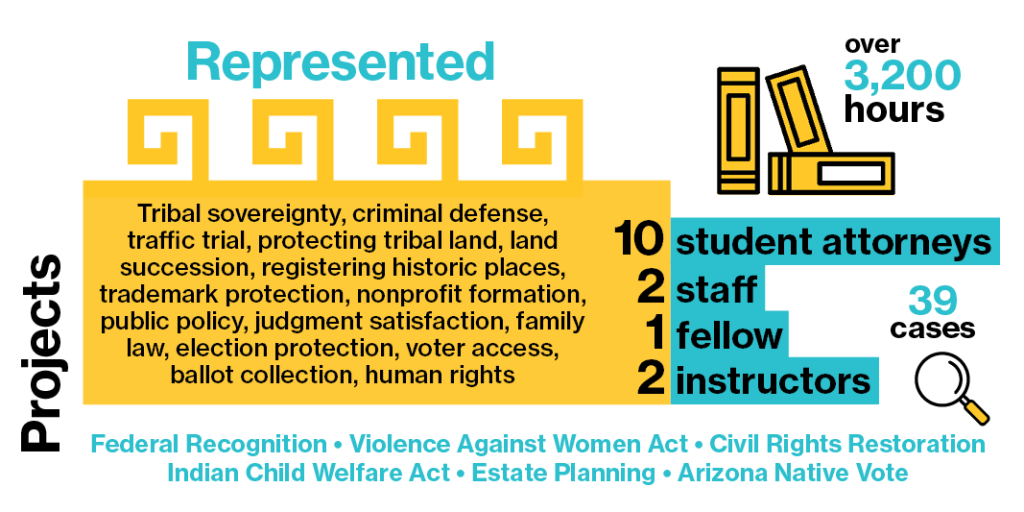
More on the Indian Legal Clinic's work in the community:
2023-2024 ILC Wills and Probate recap
The Indian Legal Clinic Wills and Probate continued estate planning for tribal citizens led by Professor Helen Burtis (’07) for the Fall 2023 semester. Clinic students Abigail Dood, Isabel Ramos, Kyle Bycroft, Michael Cunningham, Peyton Liang and Tori Stoldorf, plus returning students Christina Bustamante and Sierra Porritt assisted clients with the preparation of Indian wills and powers of attorney that conform to the requirements of federal, tribal and state law. The ILC students offered Wills and Estate Planning clinics for three Tribes: the Gila River Indian Community, the Pechanga Band of Indians and the Quechan Indian Tribe. The ILC partnered with Native Health Phoenix and hosted two seminars about estate planning and probate basics.
Two ILP students made a difference in Indian Country during Spring Break by participating in the Gila River Indian Community Estate Planning Event. First-year law students Sam Phillips (1L) and Colten Fredericks (1L) spent the week learning about estate planning and the American Indian Probate Reform Act before working with tribal citizens on wills and health care powers of attorney.
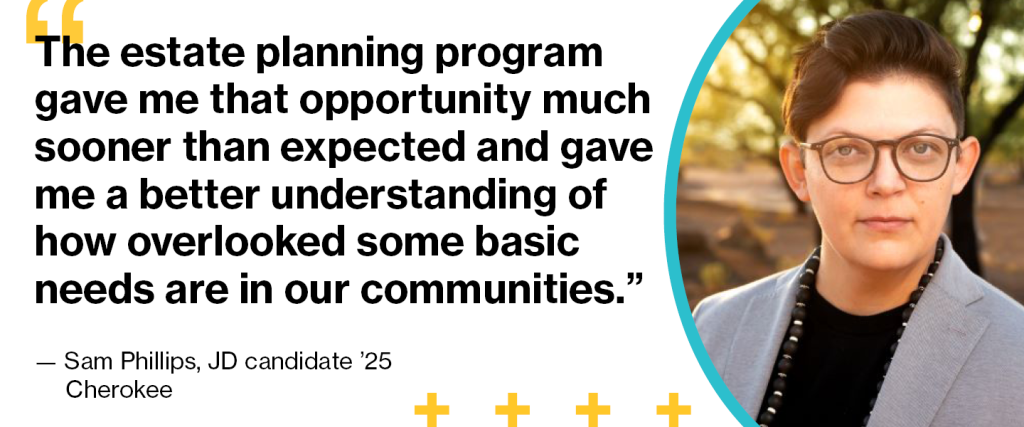
“I chose ASU specifically because it was important to me to have opportunities to serve Native communities while I was still in school,” said Phillips. “Even then, I thought I’d have to wait until my second year for experiential learning and providing legal services. The estate planning program gave me that opportunity much sooner than expected and gave me a better understanding of how overlooked some basic needs are in our communities. Being welcomed by the local Tribe and trusted with helping to protect an elder’s wishes was a very meaningful experience that taught me more than I expected. I’m very thankful to the Indian Legal Program for creating these opportunities and I look forward to serving with the estate planning program again in the future.”
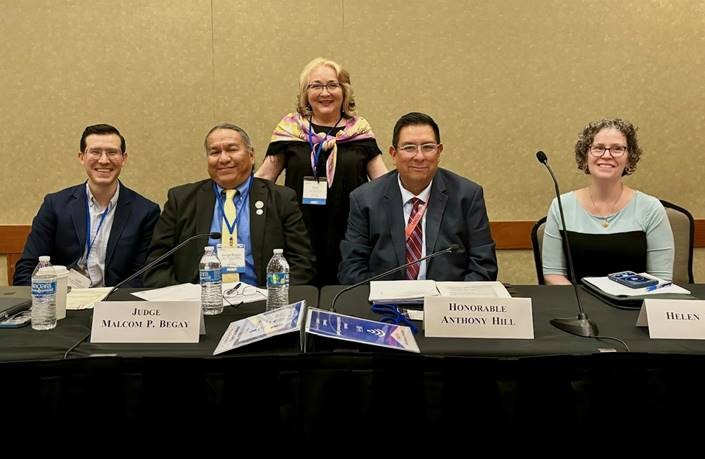
In May, Burtis addressed tribal sovereignty as a panelist at the Arizona State Bar’s annual Advanced Probate seminar on Arizona and Tribal Probate law. ILP alums Chief Judge Anthony Hill (‘06) and Colin Bradley (‘14) were co-panelists.
This spring, Burtis presented on sessions on Advanced Care Planning for the Inter Tribal Council of Arizona’s Area Agency on Aging and the Gila River Indian Community’s Community Development Department. These sessions train caregivers and staff who work with caregivers about how health care powers of attorneys, advanced directives, financial powers of attorneys and last wills and testaments can help their clientele. Professor Burtis will present to both organizations again this summer.
2023-2024 Native Vote recap
This year, Arizona Native Vote Election Protect Project prepped for the 2024 Elections. ILC students worked on many different voting rights and election issues: ballot collection, election protection, voter access, tribal authority and collecting spatial data used in our polling locator tool.
During the ABA Annual Meeting, Indian Legal Clinic Director Patty Ferguson-Bohnee led a discussion Perfecting Democracy: Pro Bono Opportunities and the State of Native American Voting Rights to encourage lawyers to volunteer during the 2024 election cycle. Ferguson-Bohnee and the new ILC Democracy Director Joel Edman participated in the Native American Voting Rights Coalition meeting in Washington, D.C., where Ferguson-Bohnee presented on case updates. The Indian Legal Clinic Native Vote Election Protection Team also submitted comments to the Arizona Secretary of State regarding Tribal provisions in the Election Procedures Manual, which was mentioned in The Arizona Republic article “Arizona Elections Procedures Manual criticized by Dems, GOP.”
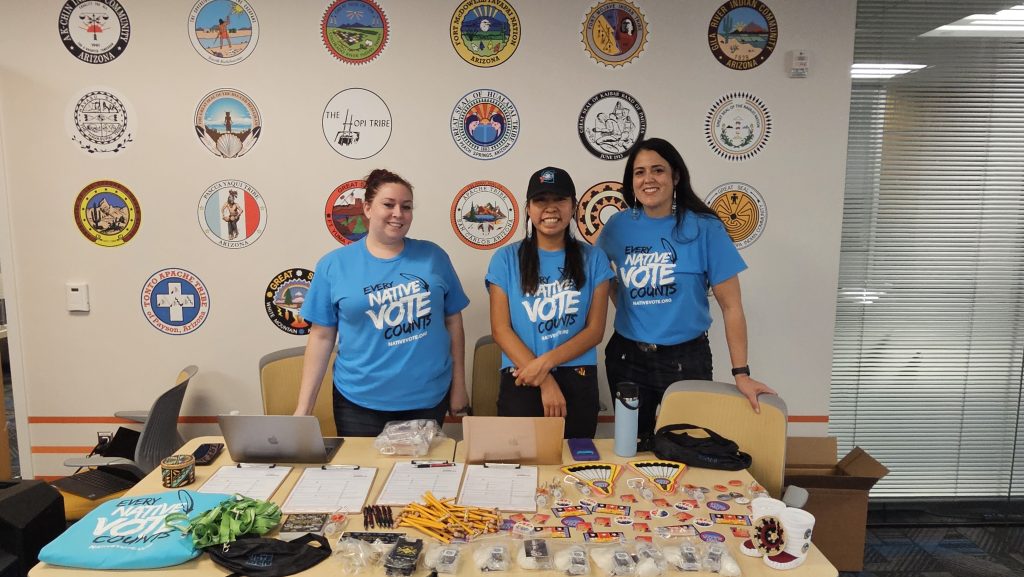
On Sept. 19, ILC student attorneys celebrated National Voter Registration Day providing voter registration services to the ASU community at both the law school and the downtown ASU American Indian Student Support Services office.
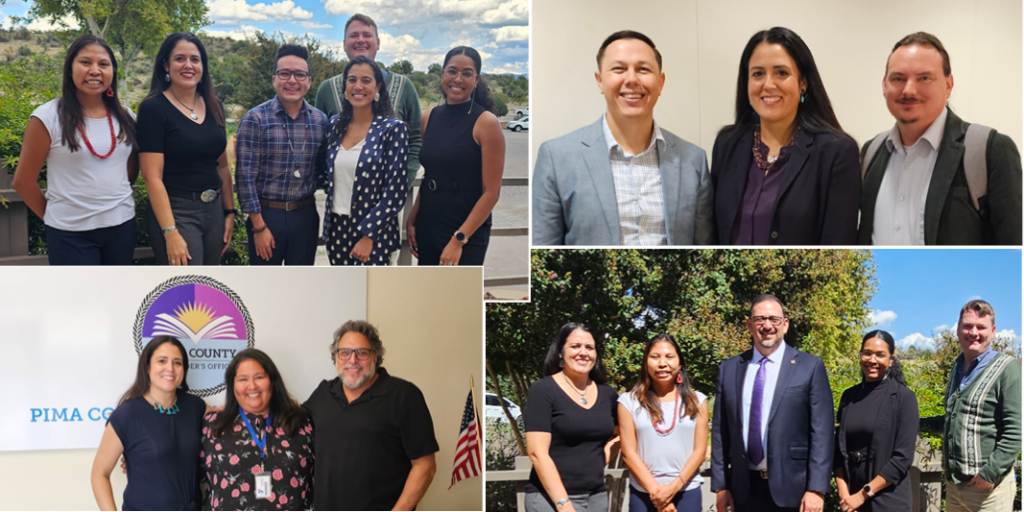
In October, the ILC co-sponsored a convening focused on partnerships between Tribes and County elections officials, many of whom are were in their roles going into 2024. Ferguson-Bohnee provided an overview of tribal voting statistics and barriers documented in recent elections by Arizona Native Vote. ILC student attorneys Maryam Gary Nez (3L), and Natalia Sells (3L) and Edman helped the facilitation team to keep notes during regional breakout sessions. Our Arizona Native Vote team met with Secretary of State Adrian Fontes, as well as Pima County Recorder Gabriella Cázares-Kelly, member of the Tohono O’Odham Nation, who shared her experiences as an elected official.
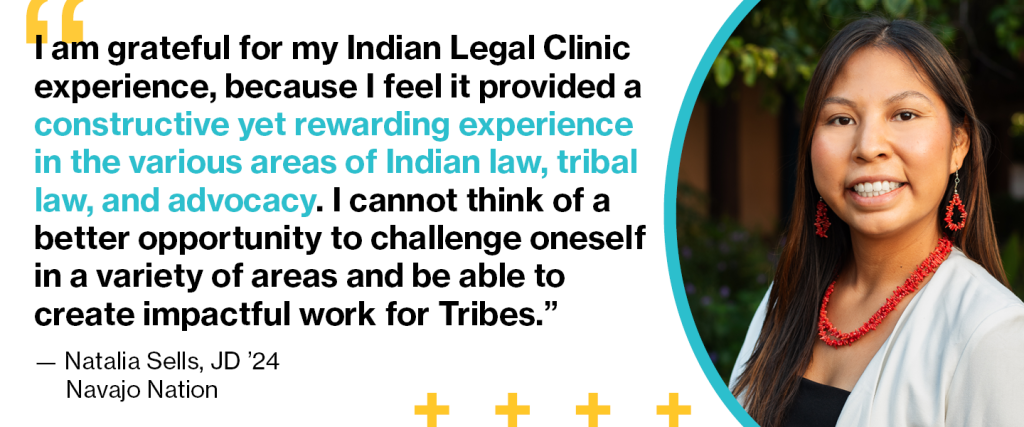
Governor Katie Hobbs approved a new Election Procedures Manual (EPM) on Dec. 29, 2023. The ILC provided analysis and recommendations to Tribal leaders throughout the EPM process. Successful advocacy from Tribal leadership led to new, robust EPM policies regarding Tribal consultation and language assistance, as well as guidance on poll worker training related to key issues impacting Native voters. At the January Native Vote Strategy Session, Ferguson-Bohnee updated Tribal leaders on the EPM and Edman gave a legislative update.
During Spring Break, the ILC welcomed Professor Marcy Karin from the University of the District of Columbia (UDC) School of Law, along with her law students to gain insights into the voting landscape within Indian Country in Arizona. Additionally, they contributed to updating voting data presentations tailored to specific tribes in the state.
For Presidential Preference Election Day, the Arizona Native Vote Election Protection Project set up its command center in the ASU Indian Legal Clinic. Ferguson-Bohnee, Edman and student attorneys Keely Driscoll (2L), Samir Grover (3L), Clayton Kinsey (3L), Natalia Sells (3L), Alexandra Trousdale (3L) and Chelsi Tsosie (3L) were joined by Project partners to assist Native voters.

Preparing for 2024 election
Native Vote is now gearing up for the July primary and November general elections. We continue to share legislative updates and present on other voting-related topics during monthly Native Vote Strategy Sessions.
Arizona Native Vote Election Protect Project is calling for volunteers for Election Day, November 5, 2024.
ASU Law students sworn into local Tribal Court
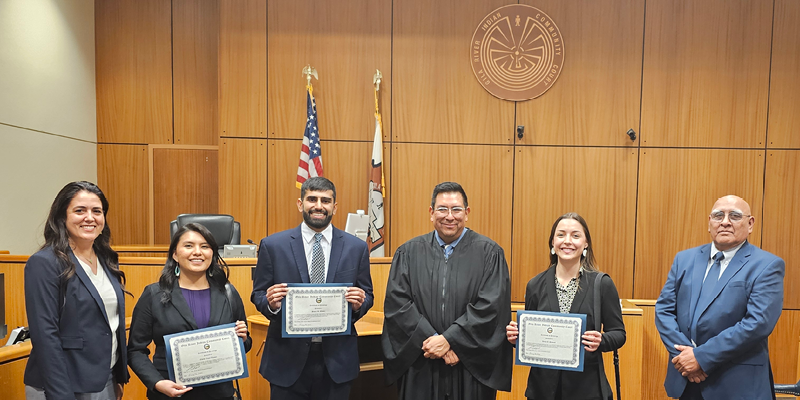
On Jan. 29, Professor Patty Ferguson-Bohnee and Indian Legal Clinic students Keely Driscoll (2L), Samir Grover (3L) and Chelsi Tsosie (3L) traveled to the Gila River Indian Community Courthouse in Sacaton, Arizona. Students were sworn into the Gila River Community Court by Chief Judge Anthony Hill (’06). Judge Charles Aragon led an informative tour during which the students met other judges and staff.
While touring the facility, students met GRIC prosecutors Ammon Orr (’16) and Carleton Giff.
As a first-time student attorney, Grover and Driscoll recently appeared before the Ak-Chin Indian Community Court in Maricopa, Arizona for hearings on behalf of clients.
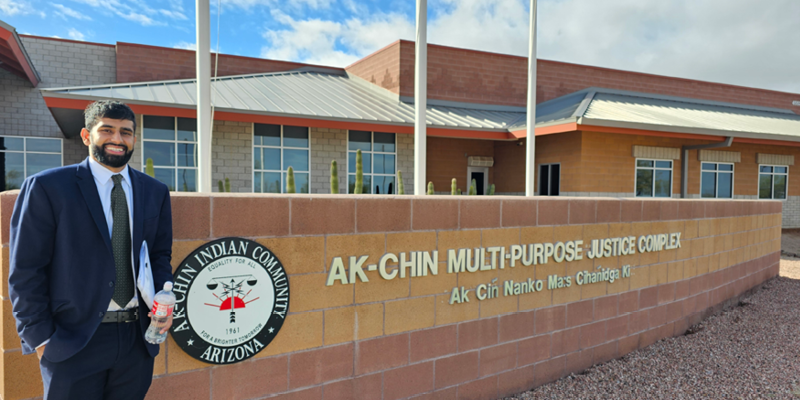
“It gives me an opportunity to apply skills I have learned and engage in meaningful work that helps real people,” said Grover. “It also gives me an advantage once I actually become a lawyer. I am glad I got my first time representing a client at arraignment over with. Also, meeting with the client in-person prior to the arraignment and going over plea options was surreal. I felt like I’m finally engaging in the type of work I envisioned myself doing, especially by representing a client in the Ak-Chin Indian Community Court.”
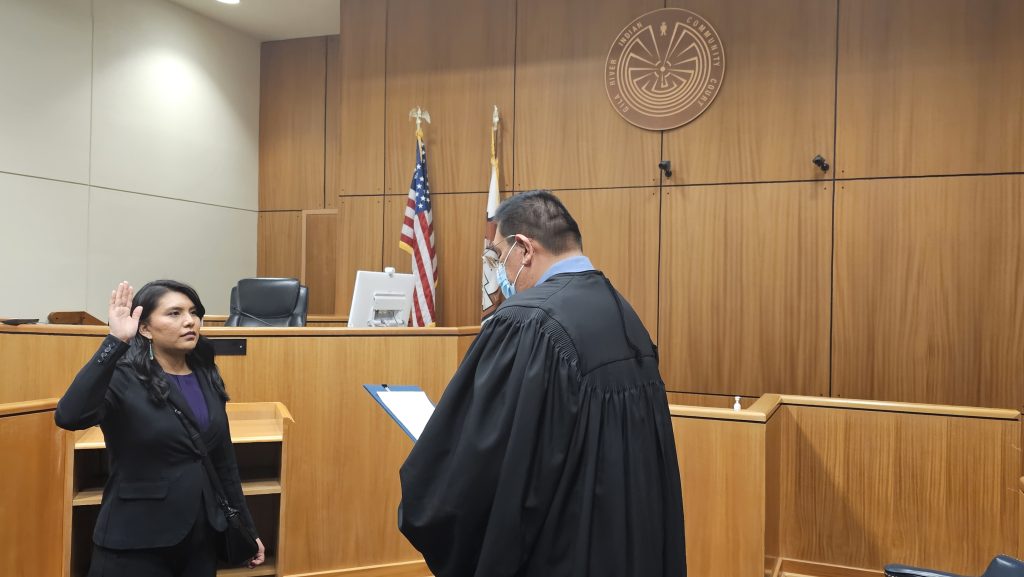
“Practicing in a tribal courtroom during law school has brought so much meaning to the concepts, rules and advice I’ve learned in classes so far,” said Tsosie. “I think because of that, I’m going to enter my future career as a more effective advocate than I would have without it. Not only that, the experience of observing Ak-Chin Indian Community implement its sovereignty through its court system was insightful. I’m thankful the Indian Legal Clinic has provided this opportunity to work with clients in a real impactful way.”
We appreciate the Gila River Indian Community Courthouse and Ak-Chin Indian Community Court for providing our law students with practical training to become effective advocates for justice.
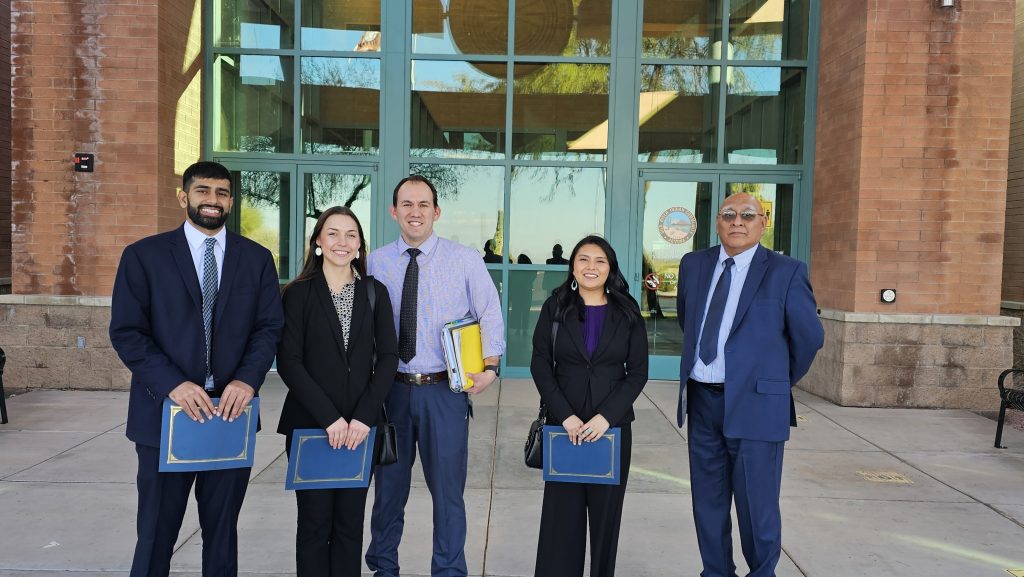
Pathway to Law alum: Morgan Oakes
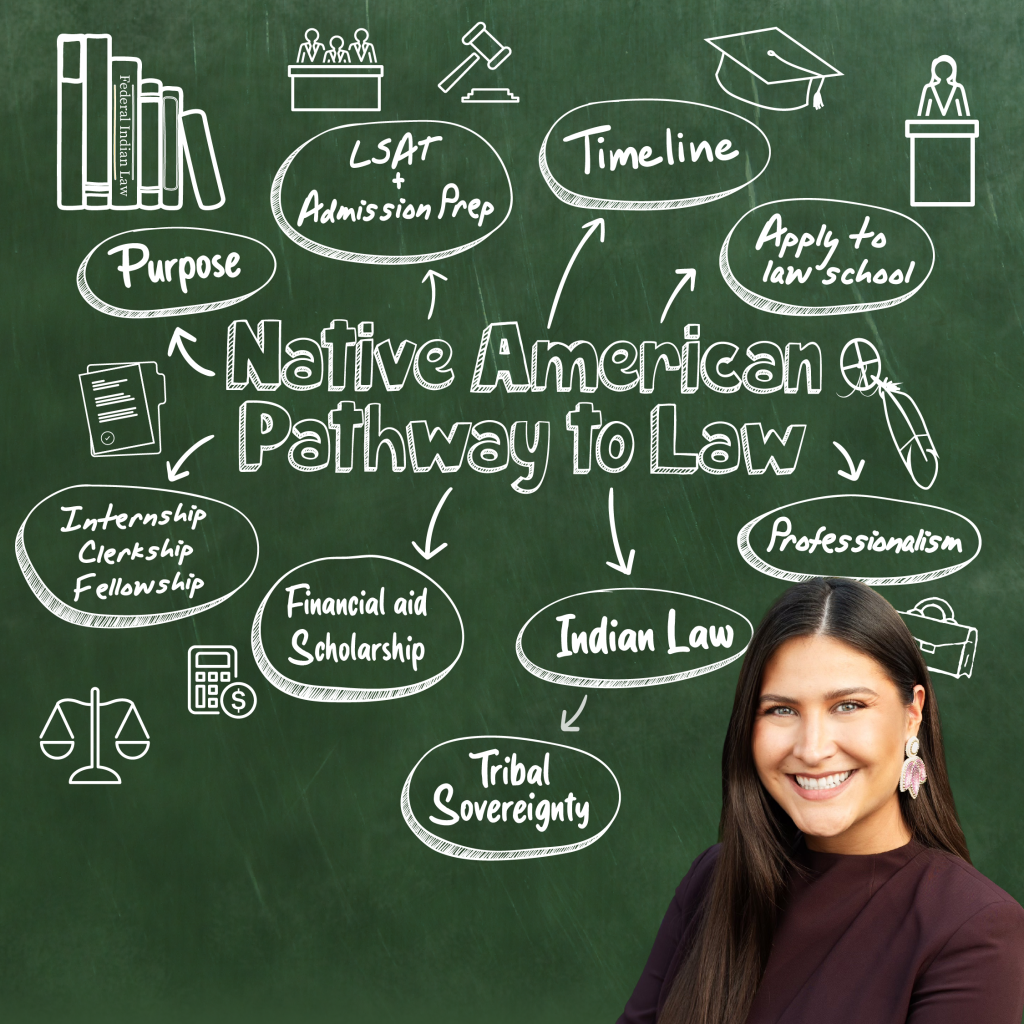
Morgan Oakes
Saint Regis Mohawk
Pathway to Law Workshop ’21
Pre-Law Summer Institute ’22
JD candidate ’25, Indian Legal Program, Sandra Day O’Connor College of Law, Arizona State University
What information did you find most important in the Workshop (i.e. LSAT prep, personal statement building, etc) and why?
Kate was very informative during the workshop and it provided me with pertinent information about the law school application process.
Would you recommend students interested in law to attend the Workshop?
I would recommend students interested in law to attend the Workshop, especially because it provides reimbursement for LSAT prep classes.
Do you have any tips for prospective students?
My tip for incoming law students is to start studying for the LSAT early, a year out was ideal for me.
Read more Native American Pathway to Law Initiative: Student Success Stories
Pathway to Law alum: Robin Bilagody
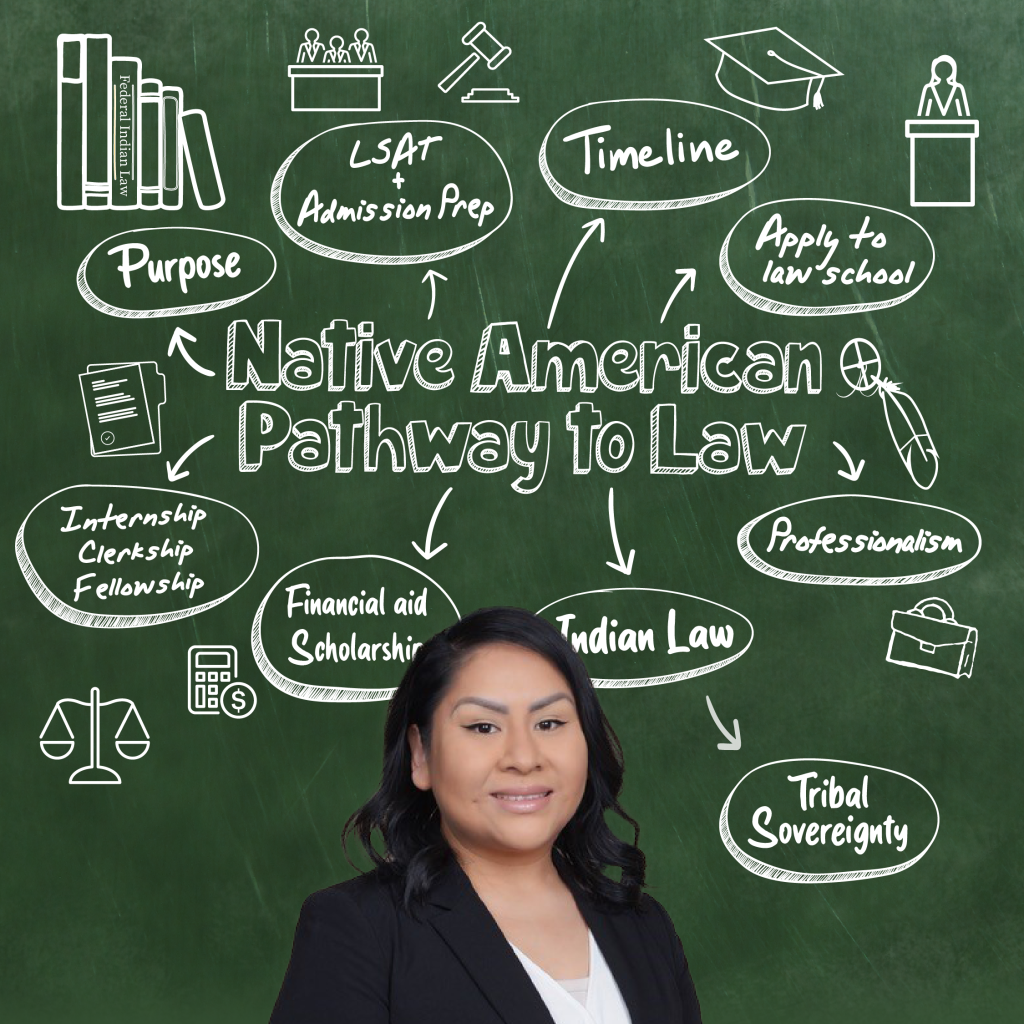
Robin Bilagody
Gila River Indian Community
Pathway to Law Workshop ’19
Pre-Law Summer Institute ’21
JD candidate ’24, Michigan State University College of Law
What was your experience with the Pathway to Law Workshop?
Overall, Pathway to Law is an amazing experience that provides valuable advice to Native students on how to prepare and approach the law school application cycle. Additionally, the law professors, deans and attorneys share their advice on everything from choosing the right law school to helpful tips on ways to succeed in law school, especially during the first year. Moreover, the PTL staff and volunteers are all extremely supportive and encouraging.
What information did you find most important in the Workshop (i.e. LSAT prep, personal statement building, etc) and why?
I found the LSAT prep and personal statement building the most helpful. The LSAT prep portion introduced me to the actual LSAT and how challenging it can be, as well as the various prep programs that can be very useful in helping to increase my score. The personal statement building guided me on ways to begin my statement that would be useful for the application cycle. During the personal statement building, we received one-on-one feedback on our statement from admissions staff. Even after the workshop, I was fortunate to receive assistance from a law professor who provided me with endless support and feedback on my personal statement and the application process.
Would you recommend students interested in law to attend the Workshop?
Yes, I would highly recommend students interested in law to attend the workshop, especially Native students. This workshop is such a valuable resource in educating and guiding prospective students on the daunting law school application process.
Do you have any tips for prospective students?
Attend the workshop and see if this is something you would like to pursue. If so, I highly recommend the Pre-Law Summer Institute, which is another amazing program for Native students interested in law school. These two programs are useful resources that are specifically structured to help Native law students succeed in law school and once we all enter the legal field. Remember your reasons for pursuing a law degree and stay motivated in the face of challenges, especially as Native people because we all deserve to be in these spaces.
Native American Pathway to Law Initiative: Student Success Stories
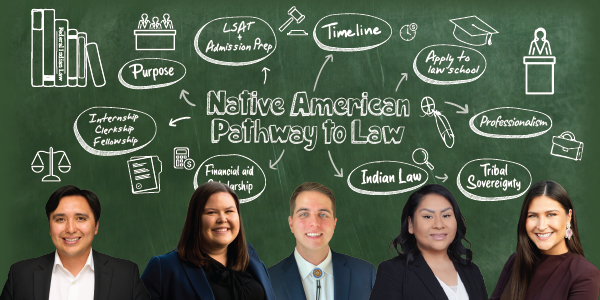
The Native American Pathway to Law team is excited to host a five-day Pathway to Law Workshop from June 5–9 at the University of California, Berkeley School of Law in Berkeley, California. This workshop offers resources, application review, LSAT preparation, financing information and more—all in a non-recruitment environment. We encourage aspiring law students to participate in this free workshop.
Five law students share their experiences of how the Pathway Way to Law Workshop solidified their decision to go to law school and provided the tools necessary to strengthen their admissions application.
Eldred D. Lesansee, Pathway to Law Workshop ’19
Ashlee Fox, Pathway to Law Workshop ’20
Geoffrey Bacon, Pathway to Law Workshop ’19
Robin Bilagody, Pathway to Law Workshop ’19
Morgan Oakes, Pathway to Law Workshop ’21
Their success ensures that future Native American students can grow up seeing someone who looks like them and embody the power of possibility for the future of Indian Country.
We welcome any aspiring law students to apply at: law.asu.edu/pathwaytolaw
Application deadline is March 15.


